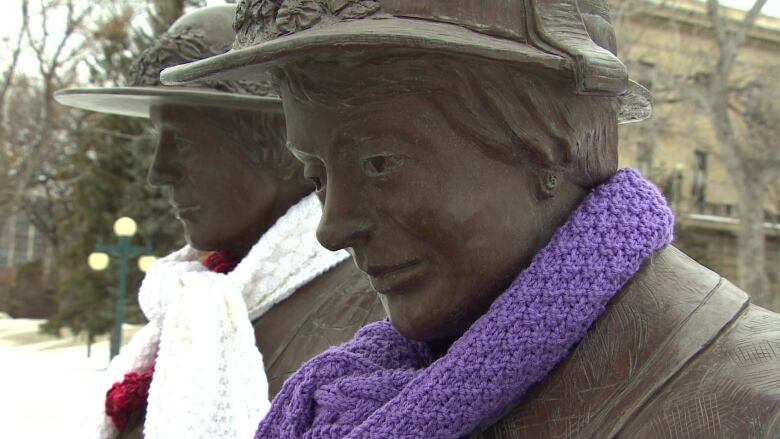Winnipeggers knit scarves for Famous Five to honour suffragist movement
Cathy D'andrea said the scarves honour the centennial of certain women gaining the right to vote

A group of Winnipeggersiskeeping The Famous Five warm on the Manitoba Legislaturegrounds by wrapping them inscarves they knitted for them.
Cathy D'andrea said she and others wanted to honour the centennial of certain women gaining the right to vote and the scarves symbolize theirrecognition of the milestone.
"It was a first step in a long road for equality," D'andrea said on Saturday ofwomen'ssuffrage in Canada, which for some womenhappened in Manitoba on Jan. 28, 1916.
The scarves are colour coded to represent different words: Green, white and violet stand for, 'Give women the vote,' D'andrea said, adding that peach was just an extra colour she had on hand.
For now, they hang around the necks of The Famous Five, but ultimately, D'andrea hopes people who need them will take the scarves.

"But with today's weather they may stay there until next winter, who knows," she said, smiling.
The scarves were only one of many ways Manitobans honoured Nellie McClung's legacy throughout January and beyond. Since November, the Manitoba Museum has featured artefacts from the province's suffragist movement in an exhibit called Nice Women Don't Want the Vote.
The exhibit is open until April.
On Wednesday, Canada's former prime minister Kim Campbell spoke at the Canadian Museum for Human Rights about women and politics to honour the centennial, too.












_(720p).jpg)


 OFFICIAL HD MUSIC VIDEO.jpg)
.jpg)



























































































